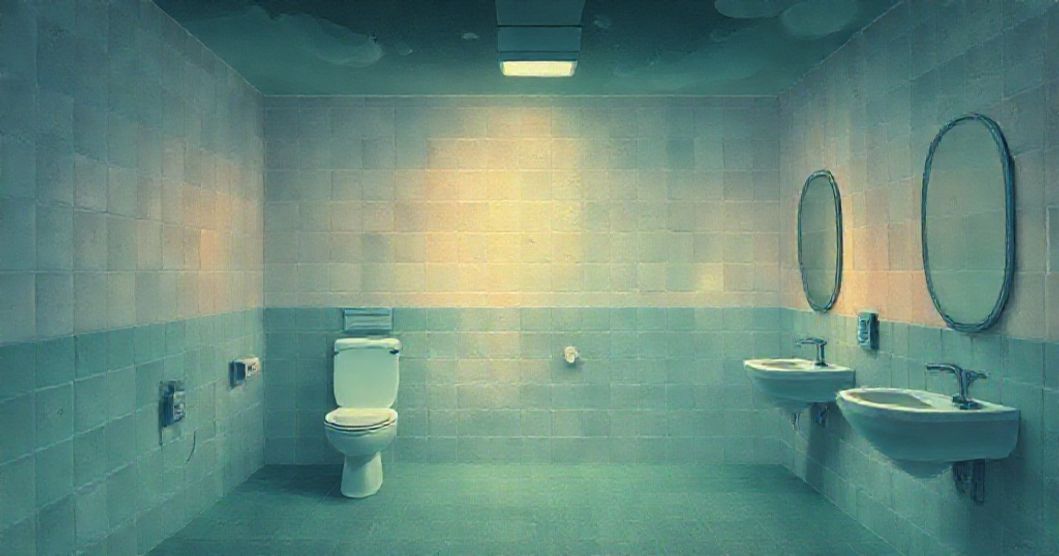Part 1: Dream Presentation
Dreams about bodily functions often serve as windows into our unconscious relationship with control, access, and basic needs. This recurring dream of struggling to find and use a restroom reveals deeper psychological themes about barriers to fulfillment and the anxiety of unmet needs. The narrative consistently depicts the dreamer in desperate need of urination, yet facing a series of increasingly complex obstacles that prevent relief—each scenario unique yet unified by the underlying tension between bodily necessity and environmental resistance.
The rewritten dream captures these scenarios with vivid sensory detail: the YMCA’s glass-walled restroom (exposing the dreamer to judgment), narrow dividers between urinals (creating physical and psychological confinement), holes in the floor (representing broken systems or inadequate infrastructure), French/Turkish basins (symbolizing cultural dissonance and unfamiliarity), pay toilets with no coins (reflecting resource limitations), and locked/restroom access issues (signaling barriers to basic human needs). The most complex obstacle involves a German-speaking cleaning woman who refuses entry without a tip, then switches to an unfamiliar language when the dreamer attempts communication—a powerful symbol of communication breakdown and exclusion.
Part 2: Clinical Analysis
Want a More Personalized Interpretation?
Get your own AI-powered dream analysis tailored specifically to your dream
🔮Try Dream Analysis FreeSymbolic Landscape: The Restroom as a Metaphor for Fulfillment
Toilets in dreams universally represent basic bodily functions and psychological needs—urination symbolizes the release of tension, vulnerability, or emotional “waste.” The recurring obstacles in this dream act as powerful metaphors for barriers to fulfillment in waking life. The glass walls in the YMCA restroom symbolize exposure and judgment, suggesting the dreamer may feel anxious about being watched or evaluated in certain situations. Narrow dividers create a sense of claustrophobia and restriction, reflecting feelings of being confined or limited in one’s environment.
The holes in the floor represent broken systems or inadequate infrastructure—perhaps the dreamer feels their needs are not being properly met by societal structures. French/Turkish basins embody cultural adaptation and comfort with the unfamiliar, while the pay toilet scenario speaks to resource limitations and the fear of not having what is needed to access basic services. The language barrier with the German cleaning woman introduces themes of communication breakdown and exclusion, suggesting the dreamer may feel misunderstood or unable to connect in certain cultural contexts.
Psychological Undercurrents: From Freud to Jung
Freud would likely interpret these dreams as manifestations of repressed anxieties or unmet desires—urination dreams often symbolize the fear of losing control or “losing face” in waking life. The recurring inability to urinate could represent blocked emotional expression or unprocessed stress that needs release.
Jung’s analytical psychology offers a different lens, viewing the restroom as a portal to the collective unconscious. The various toilet types and cultural settings may represent archetypal challenges: the YMCA (social judgment), pay toilets (resource scarcity), and foreign restrooms (cultural adaptation). The language barrier in particular could symbolize the “shadow” aspect of the self—the parts of ourselves we don’t fully understand or cannot express.
Modern cognitive theory suggests these dreams may reflect the brain’s processing of stress and daily responsibilities. The brain often rehearses potential obstacles during REM sleep, and the recurring restroom theme may indicate underlying concerns about access to resources, privacy, or support in waking life.
Emotional & Life Context
This dream likely arises from waking experiences where the dreamer feels blocked from meeting basic needs or responsibilities. The recurring “lack of resources” (no coins, no tip) suggests financial anxiety or feelings of inadequacy in providing for oneself. The language barrier may reflect recent experiences with cultural differences or communication challenges in social or professional settings.
The physical obstacles (locked doors, out-of-order facilities) could mirror real-life barriers to progress—perhaps feeling blocked from opportunities or support systems. The dreamer’s desperation to find a restroom despite all obstacles suggests an underlying urgency to address certain issues in waking life before they feel overwhelming.
Therapeutic Insights
This dream invites the dreamer to examine areas where they feel blocked from fulfilling their needs. The recurring theme of “needing to pee” can be reframed as a call to release emotional tension or address unprocessed stress. Reflecting on the specific obstacles can reveal patterns: Is there a recurring “barrier” in waking life that needs attention?
Journaling exercises could help identify triggers: When do I feel most like I’m facing “locked restrooms” or “no coins” in real life? What emotions arise when these barriers appear? This self-awareness can lead to actionable steps—perhaps creating a “resource plan” for situations where one might feel unprepared, or practicing assertive communication to overcome cultural or social barriers.
FAQ SECTION
Q: Why do I keep having dreams about needing to pee with obstacles?
A: Recurring dreams about unmet bodily needs often reflect underlying stress or anxiety about access to resources, privacy, or support in waking life. The brain rehearses potential challenges during sleep, turning daily frustrations into symbolic obstacles.
Q: What does the language barrier in my dream symbolize?
A: The language shift suggests communication challenges or feeling out of place in certain social/cultural contexts. It may indicate unprocessed emotions about being misunderstood or unable to express yourself authentically.
Q: How can I apply these dream insights to waking life?
A: Identify real-life “restroom barriers” (resource limitations, locked doors, communication gaps) and create concrete plans to address them. Practice self-compassion when facing obstacles, and consider journaling to unpack underlying emotions driving these recurring dreams.
